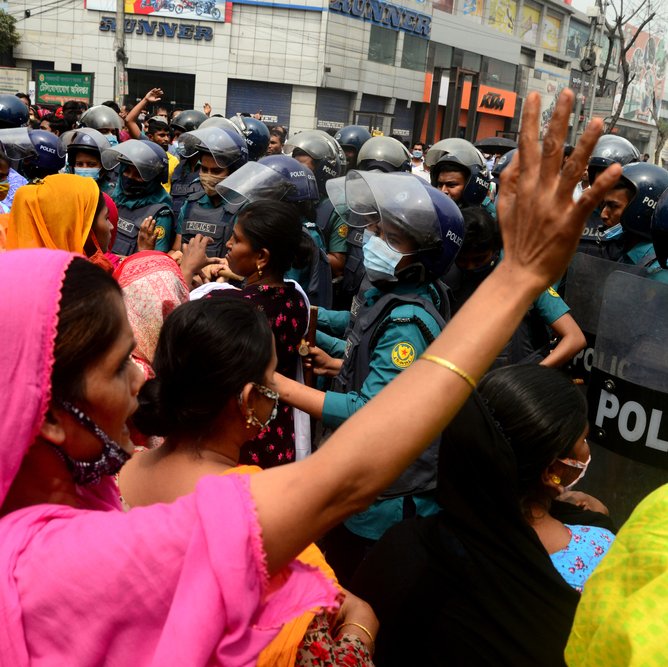Bangladesh: Global fashion brands criticised for not supporting workers arrested during 2023 minimum wage protests as intimidation tactic

Mamunur Rashid, Shutterstock
Fashion brands including H&M, Zara, Next, Matalan, Lee, Aldi, Levi’s, Calvin Klein, Primark, Lidl, Gap, Vans, and Marks & Spencer are facing mounting criticism from campaigners and trade unions for allegedly failing to support Bangladeshi garment workers who were charged after minimum wage protests last year. Workers had taken to the streets demanding an increase from the BDT 8,000 per month wage, which they argued was insufficient to meet basic living costs as inflation soared. Despite their efforts, the wage increase to BDT 12,500 fell far short of the workers' demands, sparking anger over what many saw as a dismissal of their needs. This limited outcome also came at a heavy price, as at least four workers were killed in a severe state crackdown, with 40,000 others subsequently charged in 36 cases.
The charges, which include allegations of vandalism and unlawful assembly, are seen by unions as part of a wider strategy to silence workers and intimidate them from organising or making future demands. Many charges were filed against “unnamed individuals,” a tactic that campaigners argue functions as "blank arrest warrants," allowing authorities to target any worker who raises concerns or speaks up against factory conditions. Those facing charges risk imprisonment, financial ruin, and an end to their ability to secure employment, creating a climate of fear within the workforce. Labour advocates argue that these charges are a blatant attempt to weaken union power and discourage workers from collectively seeking fair treatment.
Despite the widespread impact on workers, major fashion brands with supply chains in Bangladesh have largely failed to take meaningful action to support those facing charges. While some brands have made initial contact with suppliers, none have used their influence to ensure that cases are dropped. Campaigners argue that, despite brands’ significant leverage and stated commitments to ethical practices, they have allowed these charges to persist unchecked. Labour advocates view this inaction as part of a broader trend within the garment sector, where workers consistently face systemic barriers to fair wages and freedom of association. With charges still hanging over tens of thousands of workers, the garment industry in Bangladesh remains a repressive environment, leaving workers with limited avenues for justice or recourse.